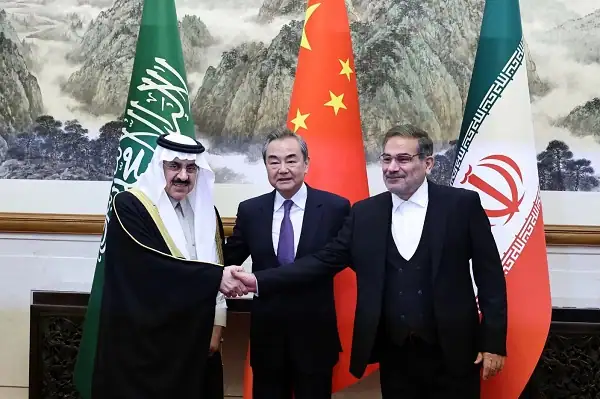The news of a potential rapprochement between Saudi Arabia and Iran has left Israel in a state of surprise, anxiety, and introspection. Israeli leaders have long considered Iran as an existential threat and viewed Saudi Arabia as a potential partner, hoping that shared fears of Tehran might help forge formal relations for the first time with Riyadh. However, the announcement of a possible tie between Iran and Saudi Arabia has complicated Israel’s regional security strategy, leaving it uncertain about its future course of action. But, why is Israel afraid of Saudi-Iran rapprochement?

Israel’s Fear of Iran
Israel’s fear of Iran stems from several factors, including Iran’s nuclear program and its aggressive rhetoric towards Israel. Israeli leaders consider Iran an existential threat because of the country’s stated goal of wiping Israel off the map. Iran has also provided financial and military support to various anti-Israeli groups in the region, such as Hezbollah in Lebanon and Hamas in Gaza, which have carried out attacks against Israel in the past. Additionally, Israel has concerns about Iran’s expanding influence in the Middle East, particularly in Syria, where Iran has been supporting the regime of Bashar al-Assad.
Israel has been working tirelessly to isolate Iran from the international community, hoping to prevent Tehran from acquiring nuclear weapons. The Israeli government has taken a hardline stance against Iran, regularly threatening military action against Tehran’s nuclear facilities.
Israel’s Hope for Saudi Arabia
In recent years, Israeli leaders have hoped that shared fears of Iran might help forge formal relations with Saudi Arabia. Saudi Arabia has been a long-time opponent of Iran and a key ally of the United States. Israeli leaders believe that a strategic alliance with Saudi Arabia could help bolster their security and provide them with greater leverage against Iran. However, despite the shared opposition to Iran, the two countries have never had formal diplomatic relations. Israel has been working to change that, hoping to build a regional security alliance against Iran.
It is worth noting that in 2020, Israel managed to establish diplomatic relations with three Arab countries, including Bahrain, Morocco, and the United Arab Emirates. There was a hope that Riyadh would follow in the footsteps of these other Arab states in normalizing ties with Israel.
Israel’s Anxiety about the Saudi-Iran rapprochement
The announcement of a potential rapprochement between Iran and Saudi Arabia has caught Israel off guard. It has undermined Israeli hopes of forming a regional security alliance against Iran. This development suggests that other countries in the Middle East may not view Iran as much of a threat as Israel does, and therefore do not see the same benefits in opposing Tehran to the extent that Israel does. It could also indicate that other countries in the region may be willing to engage with Iran and work towards more constructive relations rather than isolating it, as Israel has been pushing for. The lack of support from other countries for Israel’s strategy could make it harder for Israel to achieve its goals and could further increase its sense of isolation in the region.
Soul-Searching about Israel’s Internal Crisis
The news of a potential rapprochement between Iran and Saudi Arabia has also sparked soul-searching in Israel about the country’s internal crisis. Currently, the country is deeply divided over a contentious government proposal to increase its control over the judiciary, which has caused political turmoil and divisions among politicians in both the government and opposition.
The news has underscored how the domestic crisis risks distracting Israel from more urgent concerns like the threat of Iran, and highlights how the internal divisions are making it difficult for Israel to form a coherent foreign policy towards Iran and Saudi Arabia. This sense of internal crisis could further increase Israel’s sense of vulnerability and insecurity, as it struggles to navigate complex geopolitical challenges in the region while also facing domestic turmoil.
Damage to Netanyahu’s Foreign Policy Goals
For Prime Minister Benjamin Netanyahu, the news of Saudi-Iran rapprochement was particularly damaging. Netanyahu has long considered Iran an existential threat to Israel and has made it his chief foreign policy goal to isolate Iran. He has also sought to normalize ties with Saudi Arabia, which has never recognized Israel. The news undermines Netanyahu’s efforts to form a regional security alliance against Iran and suggests that his foreign policy approach may not be working as effectively as he had hoped. While analysts agree that the timing of the Saudi decision had little to do with Netanyahu, his opponents have seized on the opportunity to present him as weak on foreign policy. This could further weaken Netanyahu’s position and increase his sense of vulnerability as he struggles to maintain his political standing and pursue his foreign policy goals.
Yair Lapid, the opposition leader, has criticized the Netanyahu government’s foreign policy as a “complete and dangerous failure” following the announcement of a potential rapprochement between Saudi Arabia and Iran. Lapid argues that the government’s focus on domestic issues has distracted them from addressing external threats.







